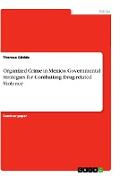Organized Crime in Mexico. Governmental Strategies for Combatting Drug-related Violence
BücherAngebote / Angebote:
Seminar paper from the year 2021 in the subject Politics - International Politics - Region: Middle- and South America, grade: 1, 7, University of Tubingen, language: English, abstract: The government strategies and some of the main operations, will be briefly presented after an overview of the existing literature in this field. This is followed by an analysis of why the government strategies not only failed to combat the violence of the TCOs but further fuelled the conflict by resulting in more violence or being violent and aggressive in themselves. As the conclusion indicates, these findings constitute the fundament for future research on conflict resolution and peacebuilding strategies for Mexico's armed conflict by demanding an improved and critically reflected governmental strategy that not solely focuses on military enforcement and 'iron-fisted' approaches.In Mexico, the drug trafficking business has been flourishing since the middle of the 20th century. After the collapse of the hegemony of the country's Institutional Revolutionary Party (PRI) in 2000, the state was no longer able to control and subdue criminal drug-trafficking organizations (TCOs). Thus, drug-related violence and organized crime escalated immensely which led former President Felipe de Jesus Calderón Hinojosa to declare the 'war on drugs' in 2006. His two successors Enrique Peña Nieto and Andrés Manuel López Obrador pursued predominantly similar strategies which will be briefly presented after an overview of the existing literature in this field.
Folgt in ca. 10 Arbeitstagen




